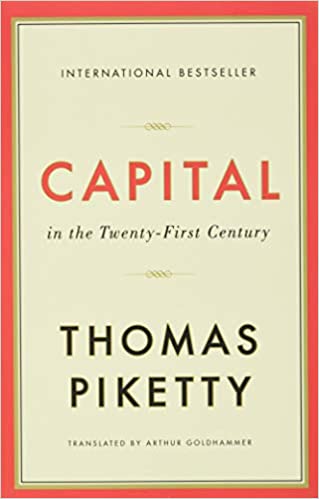Thomas Piketty – Capital in the Twenty-First Century Audiobook

Thomas Piketty’s book, “Capital in the Twenty First Century,” has truly been resoundingly backed by Nobel Reward profitable economist Paul Krugman. As a result of the traditionalists had been going loopy, I could not stand as much as reviewing it and likewise discovering out for myself what the hoopla was every little thing about. The issue for the reactionary go loopy is mentioned beneath.
Any particular person who has bothered to learn this book ought to confess that the writer is intensive in his analyses and my notion was the writer eschews prejudgment. Piketty offers exhaustive knowledge all through in a captivating historic analysis of assets and likewise the inevitable challenges of indecent inequality of wealth (” … the ‘first globalization of financing in addition to occupation (1870-1914) stays in a number of strategies similar to the ‘2nd globalization’ which has been underway contemplating that the 1970’s.” and likewise, “… commercialism immediately generates approximate and unsustainable inequalities that drastically threaten the meritocratic values on which democratic cultures are primarily based.”) There have been elements for the monetary shocks and likewise the world wars of the twentieth century, in addition to if we’re not paying consideration …
Piketty notes that, “Monetary consultants are all too typically busied with minor mathematical issues of curiosity simply to themselves.” Nonetheless, the very important financial formulation and likewise sample analyses are utterly addressed in addition to shortly comprehensible by all. Capital in the Twenty-First Century Audiobook Free. He notes that enterprise economics should be considered a department of social science, i.e., “… nationwide politics is ubiquitous and likewise … financial and likewise political modifications are completely intertwined in addition to should be researches collectively.”
If completely nothing else, the reader is suggested, “… all residents must take a major curiosity in money, its measurement, the details bordering it, and its historical past. Those that have lots of it [cash] by no means cease working to guard their passions. Refusing to take care of numbers seldom serves the passions of the least prosperous.”
So why are traditionalists freaking out over this book? Piketty concludes that public debt can solely be lowered by: repudiation (unhealthy), inflation (horrible), austerity (truly dreadful), or a dynamic tax on funding (affordable). Higher, he means that the solely wise solution to take care of indecent big selection inequality is a dynamic international tax obligation on wealth, which consequently requires worldwide transparency of accounts and likewise an finish to worldwide tax obligation sanctuaries; he goes on to state none of those steps might be easy, but does provide purposeful concepts. Clearly, the plutocrats would panic over popularization of such a tip, and it solely takes a phrase or two from them to rotate up their Particular-curiosity teams in addition to puppet organizations (I will not identify names) proper into thoughtlessly trashing these rational ideas. Due to this fact the one-star opinions from those who have not learn the book. In his introduction to this book, Piketty states, “When the worth of return on capital surpasses the worth of progress of outcome in addition to earnings, because it carried out in the nineteenth century and likewise appears fairly almost definitely to do once more in the twenty-first, industrialism immediately produces approximate and likewise unsustainable inequalities that radically undermine the meritocratic values on which democratic cultures are primarily based.” He additional mentions that “Mental in addition to political debate concerning the distribution of riches has lengthy been primarily based upon a wealth of prejudice and likewise a paucity of actuality.” He then addresses this scarceness with the presentation in addition to evaluation of the outcomes the job he resulted in purchase a large amount of historic data concerning international income in addition to big selection.
In the intro, he shortly assesses the funds but moreover the errors of earlier dispute with out knowledge. These consisted of Malthus’s curiosity in overpopulation and likewise the requirement to complete all nicely-being, Ricardo’s precept of shortage with populace in addition to manufacturing increasing as land involves be more and more scarce, and Marx’s idea of limitless accumulation with the industrial change resulting in no restrict on the accumulation of funding (which didn’t think about coming social democracy, technological growth, and simply the way to manage society with out private funding). Thomas Piketty – Capital in the Twenty-First Century Audio Book Online. The Kuznets Contour of 1955 offered knowledge from United States earnings tax return in addition to Kuznets’s personal estimates of nationwide earnings in conclusion that inequality raised in the very early part nonetheless declined in the later phases of industrialization. Regrettably, this contour significantly understated the roles of the World Wars and fierce monetary and likewise political shocks that led to the lower in inequality between 1914 and 1945 and failed to debate the rising inequality after 1970.
Piketty seeks to contribute “to the debate regarding the finest methodology to arrange society … to perform a merely social order … completed correctly below guideline of regulation … topic to democratic argument.” He mentions he has “no curiosity in denouncing inequality or capitalism per se … so long as they’re warranted.” He functioned briefly in the United States in addition to discovered the work individuals economists implausible. “There had truly been no vital initiative to assemble historic data on the dynamics of inequality since Kuznets, but the profession continued to provide purely educational outcomes with out additionally understanding (the) truths.”
